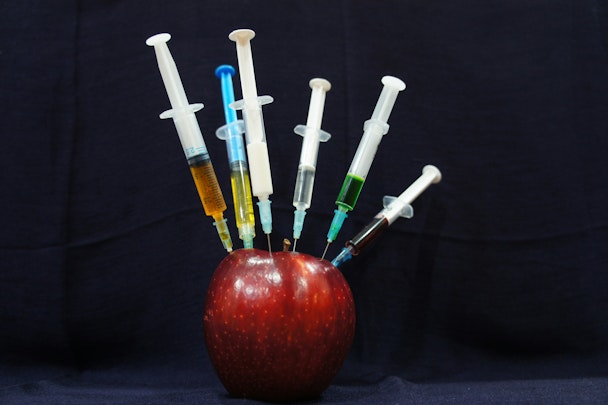AI is only as good as its inputs, so let’s feed it true creativity
iCrossing UK’s Mark Bell has a warning: AI can still be exciting – but only if we help it avoid the beige ‘regurgitation rabbit hole’ by feeding it bold, interesting ideas.

We're feeding AI indiscriminately. Is it time to change its diet? / Sara Bakhshi via Unsplash
Let us quickly remind ourselves of the world before AI (or rather, before all the articles and social media posts written about it over the last 18 months).
We all know that AI is learning fast – lightning fast. But rather than running scared, should we not be embracing our newfound friend, helping it out of its nappies as it finds its feet?
AI is only as good as the experiences it’s learning from. Those experiences are our experiences, the experiences we created – yesterday, last year and from generations before us. But when you pick up your school exercise book you wrote in as a child (or even the email you wrote your boss last week) aren’t you a little bit embarrassed about how it sounds? What about if it was going to be used as a learning tool for future AI-informed generations?
I want to argue that we should be helping AI by making content and experiences that are easy to learn from and which fuel the virtual minds of the future bots, helping the artificial become ever more believable.
Advertisement
Why this passion for helping the artificial version of ourselves?
Like many, I’m slightly addicted to writing AI prompts and being wowed by the outcome. But I’m no AI scientist.
From talking to a few actual AI scientists recently, I’m increasingly able to appreciate the effort that goes into fine-tuning AI, specifically the process known as ‘reinforcement learning through human feedback’ (RLHF). Still, ‘through human feedback’ worries me – not out of concern that humans will reinforce biases within AI, though that’s something we must continue to talk about – but because I’m worried for the lack of originality in what we create.
Advertisement
We are making the world beige
If we’re not careful, the AI of the future will be different shades of beige rather than bright orange. I urge that while humans are still in control – for now, we very much are – we need to put even more focus on originality, using our craft in ever impactful ways to push the boundaries of what we do.
With access to so much data, AI prompts flying everywhere, and increasing pressure to deliver work within budgets and timelines, the urge to repurpose is becoming ever more apparent. We must resist.
This isn’t about having bolshy, passionate creative directors, with their shelves creaking under the weight of Cannes awards. This is about every one of us creating digital solutions (whether you’re creating UX, writing content, or creating brands). What if I suggested that, when we start any of this work, we don’t do any research, look at data, have a workshop with stakeholders, write AI prompts, or even do a competitor audit?
Before I lose my job, let me clarify: I’m not saying that those things are not needed. But, please, let us do it later and use some (almost – our brains naturally go to the past) genuine originality to decide where to start solving the problem, and then and only then validate and refine it with research, AI prompts, and client engagement.
More genuinely original thinking going into our digital experiences will in turn create increasingly richer and higher-quality data, enabling AI’s outputs to be less hallucinogenic.
We need to act fast. Creating our own ChatGPT instances and other AI applications is becoming increasingly simpler, putting us on the precipice of the regurgitation rabbit hole.
The AI future can be bright – if we help it avoid the beige.
Suggested newsletters for you
Content by The Drum Network member:

iCrossing UK
We are iCrossing. We build seamless digital experiences that influence consumers to act. With unrivaled access to Hearst’s powerful consumer insights, we uncover...
Find out more
